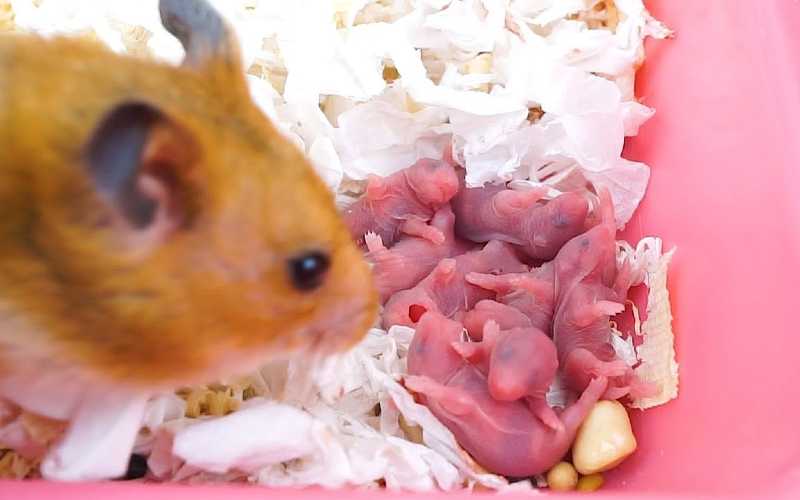hamsterhappy.co.uk is a participant in the Amazon Services LLC Associates Program and other affiliate advertising programs designed to provide a means for us to earn fees by linking to Amazon.com and affiliated sites. Affiliate links may be used on this page and in hamsterhappy.co.uk articles, but they do not impact on the price that you pay and they do help me to get this information to you for free. Read my privacy policy for more information regarding affiliates.
Today’s blog is all about newborn hamsters – we have everything you need to know about these baby bundles of cuteness
Nothing is cuter than a baby animal. If like us you absolutely adore hamsters, no baby animal is cuter than a baby hamster. Whether you have been trying to breed hamsters as described in our article here, or it is a happy surprise, you may find yourself squealing in joy when confronted with a brand new litter in your home (it was just one time I promise!).
In fact, it can be hard to resist going in and having a play with your new miniature friends. Unfortunately, though, this is the absolute worst thing you can do.
Do not Interfere with Hamsters giving Birth
Do not interfere at any time during the birth or after. If you have already read our guide on breeding hamsters, you know how aggressive pregnant mothers can be. After the birth this gets even more extreme, and so you should do everything you can to avoid the new mum and her pups. If you did touch the pups the mum would likely abandon them, or in some extreme cases even eat them. This is especially the case for first time mums who are going through the added stress of the unknown, but regardless of whether they are a new mum or old, stay well clear and let them do their thing.
Separate any other Hamsters from the Cage
The only thing you should do is if it is a surprise birth and the father or any other hamsters are still in the cage, separate them out into a separate home to stop them from being attacked by the pups mother.
Avoid newborn Hamsters for the first 3 Weeks
You should maintain this avoidance for around three weeks, until they are able to be weaned off their mum and be fed solid hamster feed, broken down and softened by water. Until this time you should not even clean the cage. Simply fill up her supply of food and water as discreetly as possible and let them be.
This can be extremely tough, especially if the mother abandons, or worse, her children before they are a week old. As painful as it is though, it is the natural process and there is very little you can do.
Gendering the Newborn Hamsters
Once the babies have got to three weeks though, and are fully on to solid foods, you can start to delicately handle your new companions and get them used to your touch. At this point you can also now gender the litter. This you should do as soon as possible, and then separate the boys and girls to avoid any inbreeding in the future, as this can be dangerous and has a lot of associated genetic birth defects.
Once this is done, you have around three more weeks before the hamsters reach sexual maturity and can be rehomed.
In this time, you can play with them, treat them, and show them their new homes. It truly is a magical process, and despite all the stress, you won’t regret it for a second.



1 thought on “Newborn Hamsters”